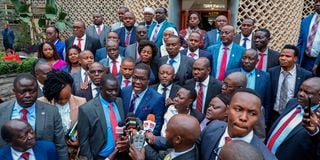Kenya Kwanza carries the day as Finance Bill sails through

Opposition MPs address the media at Parliament Buildings, Nairobi on June 20, 2024 after the Finance bill 2024 sailed through the second reading.
What you need to know:
- Despite the significance of the Bill, 30 MPs gave the crucial afternoon manual vote a wide berth.
- Speaker of the National Assembly Moses Wetang’ula indicated that there were no abstentions.
President William Ruto won the first round in the battle over the Finance Bill, 2024, with his troops marshalling 204 votes to push the proposed legislation past its second reading to the committee stage.
Out of 349 members of the National Assembly, 115 voted No. Surprisingly, despite the significance of the Bill, 30 MPs gave the crucial afternoon manual vote a wide berth.
Announcing the division results, House Speaker Moses Wetang’ula indicated that there were no abstentions.
“I now order for the Bill to be read a second time. The matter of the Finance Bill is now over,” the Speaker ruled. “The committee of the whole House... will sit from Tuesday morning.”
Opposition MPs will have a final chance to save Kenyans next week when they consider the Bill, clause by clause at the committee stage. Amendments proposed by President Ruto’s side will be considered in the third reading (committee of the whole House).
During debate, National Assembly Speaker Moses Wetang’ula defended National Treasury Cabinet Secretary Njuguna Ndung’u against claims of perpetrating executive overreach following his letter to the MPs warning of looming budget cuts if the Bill was passed with amendments as proposed by a House committee.
Mr Wetang’ula made the directive after Minority Leader Opiyo Wandayi accused Prof Ndung’u of trying to arm-twist MPs.
The Ugunja MP called on Mr Wetang’ula to find Prof Ndung’u’s letter to Parliament in breach of constitutional provisions on the separation of powers.
However, in his communication to the House, Mr Wetangu’la said the CS’s advisory was a mere reminder to the MPs of their constitutional and statutory obligations.
“I don’t view it as a directive in the manner argued by the Leader of Minority,” said Mr Wetang’ula.
“The House is merely being urged to factor in this increased expenditure when considering the ways and means of financing the approved supply.”
Prof Ndung’u on Wednesday wrote a letter to the National Assembly hinting at downsizing the country’s Sh3.9 trillion budget by Sh200 billion should the Bill be passed with changes.
The CS listed the Teachers Service Commission (TSC), the energy sector and the school feeding programme among areas to be hit with budget cuts.
Treasury is also targeting the National Government Constituencies Development Fund and the National Government Affirmative Action Fund, which the MPs control.
The decision, which the MPs have dismissed as unconstitutional, comes after the Finance and National Planning Committee of the National Assembly, which is chaired by Molo MP Kimani Kuria, succumbed to public pressure and dropped punitive taxes outlined in the Finance Bill 2024 in a report to the House.
The Bill is projecting to raise an additional Sh302 billion on top of the projected Sh2.95 billion in ordinary revenue and Appropriation in Aid to finance the 2024-2025 budget.
Budget and Appropriations Committee chair Ndindi Nyoro (Kiharu) urged his colleagues to pass the Bill without amendments in order to avoid Treasury’s budget cuts.
“Those who vote against the Finance Bill should tell Kenyans why they are voting against the provision of electricity, roads and other services in their constituencies,” he said.
The budget cuts target, among others, the Energy Department, which stands to lose Sh21.8 billion, the Teachers Service Commission (Sh18.9 billion) , the State Department for Roads (Sh15.1 billion) and NG-CDF (Sh15 billion).
To support its decision, the National Treasury is invoking Article 211 of the Constitution, which prescribes guidelines on the proposals that may be passed by the House and the limits applicable to the proposals.
“Should the Finance Bill be approved as proposed by the National Treasury, the National Assembly can proceed with the consideration of the Appropriations Bill as published,” said Prof Ndung’u.
However, in the event the MPs pass the Finance Bill with changes, expenditure cuts across the three arms of government — executive, parliament and judiciary — are inevitable “to remain within the provisions of the PFM Act.”
Additional reporting by Edwin Mutai






